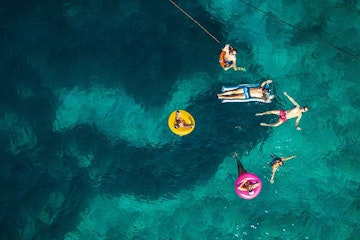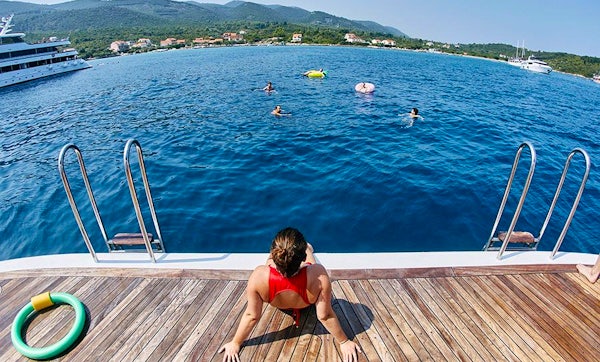Summer is here, do you have any plans? If not, a vacation in Croatia, or a trip island hopping in Greece are both excellent choices with endless sunshine, blue skies, pristine and crystal-clear water. A sunny summer holiday in a coastal location means you’ll need to invest in a sunscreen that allows you to swim, surf, and sunbathe carefree! But how do you choose an appropriate sunscreen that doesn’t harm the environment? If you are a lazy traveller like me, simply spend two minutes reading this article and by following the tips below, choose the right sunscreen for you!
Bad environmental influence brought by eco-unfriendly sunscreens
Over the past 5 years, several studies have revealed the negative effects of the ingredients found in most sunscreens on corals. The high concentration of these chemicals is extremely toxic, and with approximately 14,000 tons of sunscreen deposited into the oceans each year, they have noticeably adverse effects, such as damaging coral DNA and larvae, particularly in areas with a high frequency of divers.
With the increased frequency of coral bleaching events as a result of climbing ocean temperatures and acidification, it is positive to understand that by choosing the right sunscreen can we contribute to minimizing the threat to corals. Though it seems that selecting a sunscreen without toxic chemicals, or better yet, opting for eco-friendly forms of sun protection is quite insignificant, this simple and vital adjustment will help both our corals and the local population have a healthier future.
Look out for bad ingredients in sunscreens
Most people are unaware of the fact that most sunscreens available on the market actually contain chemical filters. These products typically include a combination of two to six of the following active ingredients: oxybenzone, avobenzone, octisalate, octocrylene, homosalate and octinoxate. Be aware of these terms when buying your sunscreen! Their names hide somewhere on the back of the sunscreen bottle, where you don't see or read them and therefore end up buying them.
Oxybenzone harbours the most harmful influence on human skin! It is a genotoxic endocrine disrupter and potential mutagen, which can not only cause severe allergic skin reactions but also exhibit procarcinogenic activities and affect the gene expression of offspring. In other words, this evil chemical component can reduce the immunity and fertility of both plants and animals, especially for their embryonic development. It does not take much to realize that it is better for you to avoid products with these components, since they are potentially very harmful both for your health and marine ecosystems!

Now that we know what not to buy, the obvious question is what kind of sunscreen is the best one for our skin. First, let's get back to basics. We all know that there are two types of UV radiation: UVB, which is responsible for actual sunburns, and UVA rays, which penetrate deeper. Physical blockers protect against both of them by reflecting the UV rays, while chemical blockers absorb the rays and allow UVA to reach those deeper layers of your skin, causing certain irritating effects on our skin as well as damaging our skin cells and structure. Moreover, some chemical blockers can also disrupt hormone production inside our body. Bear in mind that physical (mineral-based, natural) sunscreens are always a better choice than chemical (conventional) sunscreens!
So, how do we choose the right sunscreen? While chemical sunscreens always contain several bad chemical ingredients, physical sunscreens work with the help of one protection layer consisting of Zinc Oxide and Titanium Dioxide. Therefore, try to choose physical (mineral-based) sunscreens in order to keep your skin healthy in the future! If you want to master the skill of finding the perfect sunscreen, then try to find products with larger zinc oxide particles and smaller titanium dioxide particles.
Choose your sunscreen directly from the following brands
If you find it too tiresome wandering around the shelves and reading a list of those boring chemical components, you can simply choose the eco-friendly brands recommended below.

The Most Trustworthy Sunscreen Brands (Verified by EWG):
- The Honest Company (American)
- All Terrain (American)
- Badger (American)
- Goddess Garden (American)
- Sunology (American)
- Thinksport (American)
- Blue Lizard (Australia)
- Alba Botanica (EU)
Also, we have updated our list of eco-friendly sunscreen brands on the Croatian market in 2019 to figure out which ones are environmentally safe. If, when arriving in Croatia, you realize you have forgotten your sunscreen or you have decided to buy it when in Croatia, then the following recommendation list for your last-minute purchase in Croatia is designed for you:
- OLIVAL SUN Face Cream SPF 30 (Croatia) *A combination of physical and chemical blockers
- Avril Face SPF 50 (France, vegan-friendly)
- Avril Face SPF 50 (France, vegan-friendly)
- NUXE Slim Sun Protection Cream SPF 30 for face and body (France)
- Cocosolis Natural Sunscreen Lotion SPF 30 (Bulgaria)
- REN Clean Skincare Clean Mattifying Face Sunscreen SPF 30 (UK,vegan-friendly)
- Green People Sunscreen SPF30 No Smell (UK)
- Biosolis Sunscreen for body and face ZF 30 (Belgium)
To summarize, just a two-minutes of research on the most appropriate sunscreen before your final holiday purchase will make you and your marine ecosystem so much healthier! Remember to always look out for the mentioned chemical components when you are choosing your sunscreen so that both your skin and nature can remain beautiful and safe.
Choose the right sunscreen and have a beautiful summer!
